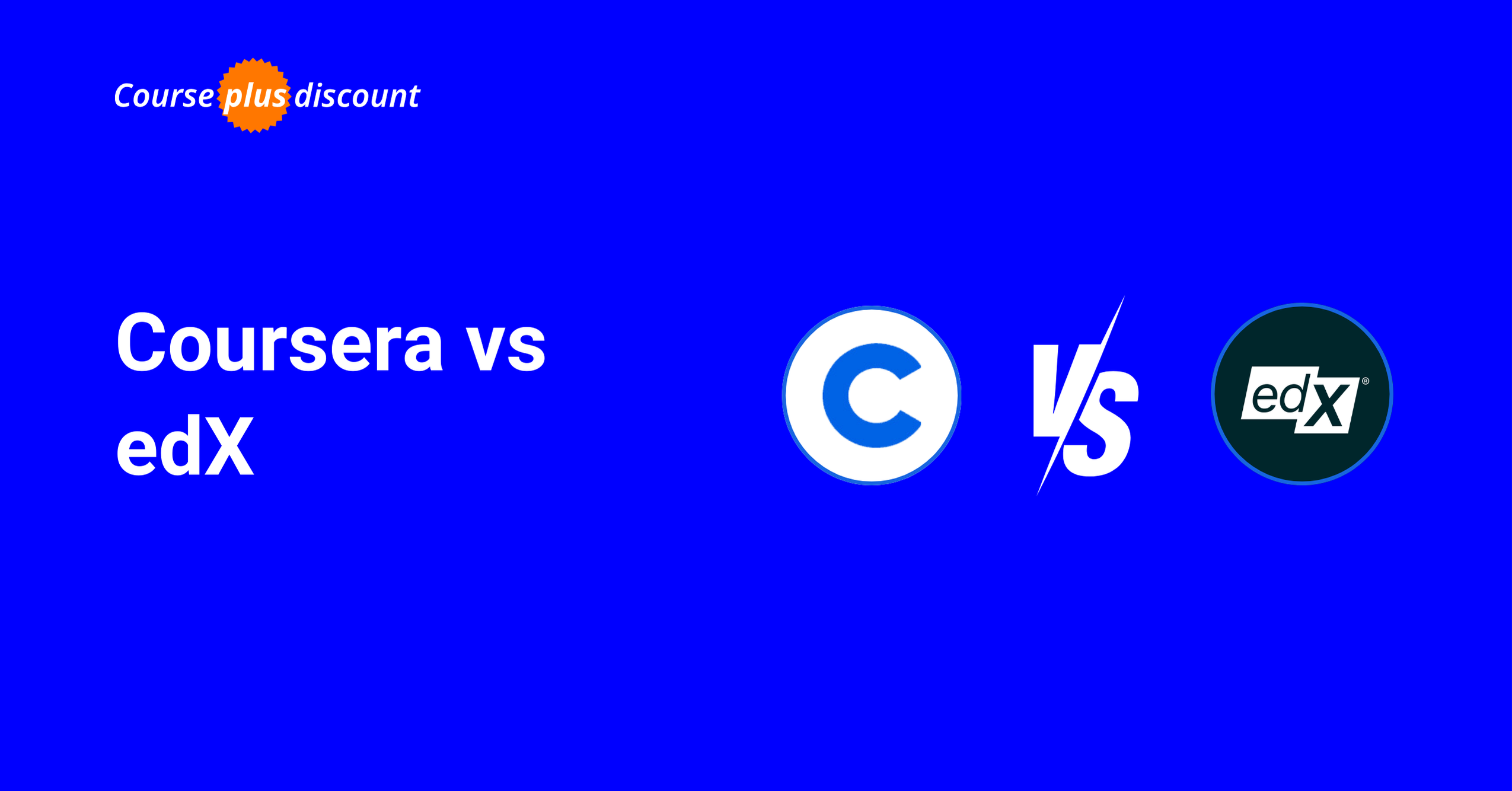When it comes to online learning giants, Coursera vs edX dominate the space with millions of learners worldwide.
Founded in 2012, Coursera (by Stanford professors) boasts 7,000+ courses, 148+ million users, and 325+ partner institutions.
Meanwhile, edX (by Harvard and MIT) offers 3,000+ courses, 35+ million users, and partnerships with 260+ institutions.
Let’s break down their key differences in detail.
TL;DR: Which Is Better Between edX And Coursera?
Coursera is better than edX due to its enormous course catalog (7,000+ vs 3,000+), more flexible subscription model, higher course completion rates, and stronger industry recognition of certificates, mainly through partnerships with Google, IBM, and Meta.
Coursera vs edX: Quick Comparison
Both platforms were founded close to 2012 by prestigious universities – Coursera by Stanford professors and edX by Harvard and MIT. Here’s how they stack up against each other:
| Feature | Coursera | edX |
|---|---|---|
| Number of Courses | 7,000+ | 3,000+ |
| Free trial | 7 days | 1st chapters only |
| 14 days Refund | ✅ | ✅ |
| Active Users | 148+ million | 35+ million |
| Partner Institutions | 325+ | 260+ |
| Free Course Access | ✅ | ✅ |
| Certificate Cost | From $49 | $50-$300 |
| Subscription Option | $59/month onwards | ❌ |
| Corporate Training | ✅ | ✅ |
| Degree Programs | ✅ | ✅ |
| Mobile App | ✅ | ✅ |
| Course Languages | 50+ | 15+ |
Now, let’s compare the 2 platforms in detail to understand which is better between edX and Coursera.
1. Course Offerings
Both platforms offer diverse course catalogs, though Coursera has a significantly larger selection. Here’s how their offerings break down:
Coursera offers 7,000+ courses across 11 categories, including business, technology, data science, health, arts & humanities, and personal development
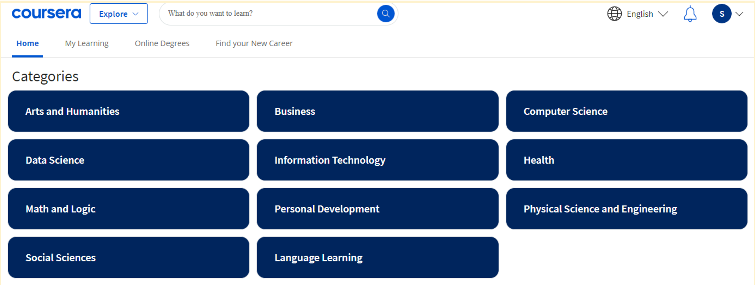
Here are the types of Learning Programs you can find on Coursera:
- Individual Courses: 4-12 week self-paced courses
- Guided Projects: 1-2 hour hands-on tutorials
- Specializations: Series of related courses (3-6 months)
- Professional Certificates: Career-focused programs (4-7 months)
- Degrees: Full bachelor’s and master’s programs
edX features 3,000+ courses across 15 categories with a stronger emphasis on academic subjects like physics, chemistry, and humanities.
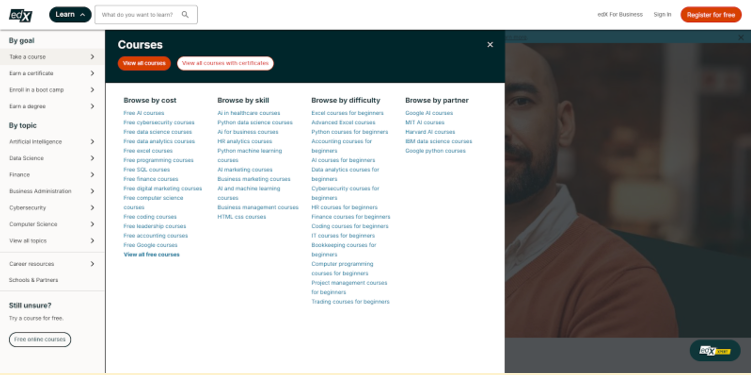
Types of Learning Programs on edX:
- Individual Courses: Self-paced courses
- Professional Certificates: Career-focused certifications
- MicroMasters: Graduate-level courses
- XSeries: Deep dives into specific subjects
- Full Degrees: Bachelor’s and master’s programs
Verdict: Coursera is a winner because it offers many courses in various fields instead of edX, which focuses heavily on STEM.
2. Quality Of Instruction And Instructors
Both platforms maintain high standards for instruction quality but with different approaches, such as:
Coursera has faculty from top universities like Stanford, Yale, Princeton, and more. Here is what I appreciate about Coursera courses in terms of quality of instruction and instructors:
- Instructors are industry experts from leading companies (Google, IBM, Meta)
- Peer-reviewed course content
- Regular course updates
- Interactive assignments and quizzes
On the other hand, edX is not very different in terms of the quality of instructors. However, I find edX’s written content and instruction too dry, which might be one reason it may have higher dropout rates.
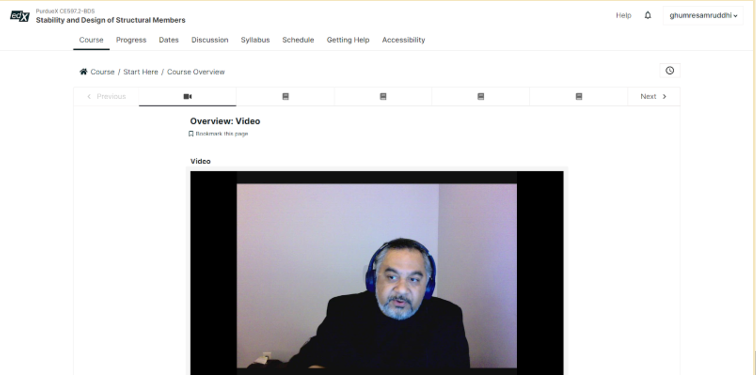
That being said, here are some things I like about edX’s quality of instruction and instructors
- Instructors are primarily from academic institutions.
- Strong focus on traditional university teaching methods
- More theoretical approach
- Emphasis on scholarly content
Verdict: Both platforms have brilliant instructors. However, Coursera wins as it is more interactive and has written instructions that are easy to follow.
3. Certificates And Recognition
If you are wondering, “Does a Coursera certificate have value?” I have good news for you. Coursera certificates carry significant weight in the job market due to:
- Direct partnerships with industry leaders
- Accreditation from prestigious universities
- Integration with LinkedIn profiles
- Continuing education credits
- Growing employer recognition, especially for tech and business courses
Does An edX Certificate Have Value?
edX certificates are valuable for the following reasons:
- Academic credibility through university partnerships
- Professional development documentation
- Continuing education credits
- Career advancement, particularly in STEM fields
Verdict: Coursera certificates are a winner because they are more popular and offer more accredited certificate courses than edX.
4. Learning Experience
Coursera’s platform has a clean interface that provides an intuitive navigation experience. It features a progress-tracking dashboard that helps learners track their achievements. Additionally, seamless video playback enhances the learning experience.
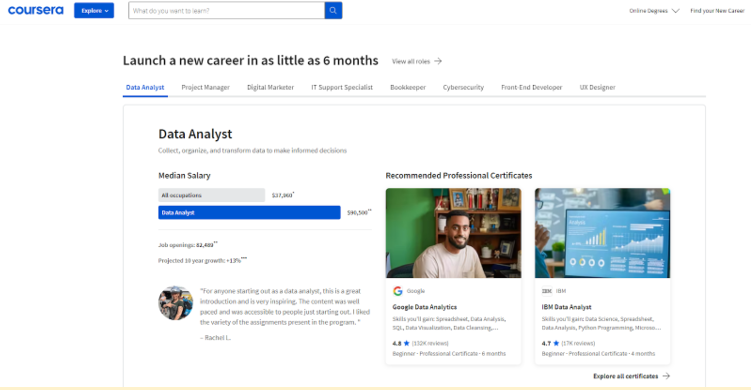
On the other hand, edX presents straightforward navigation that guides users effectively through its offerings. The platform maintains a more traditional course structure, which appeals to those seeking a classic educational approach.

Verdict: edX and Coursera’s UIs sometimes feel less polished than those of the other online learning platforms. It is a tie.
5. Course Structure And Format
Coursera course structure and format are very easy to follow and engaging. Here is what it offers:
- Weekly modules
- Video lectures with transcripts
- Interactive quizzes
- Peer-reviewed assignments
- Discussion forums
On the other hand, the edX course structure could use some changes to make it more engaging and interesting:
- Self-paced learning
- Video lectures
- Text-based content
- Problem sets
- Discussion boards
6. Learning Tools And Resources
Coursera is keeping up with the new trends of online learning and offers many learning tools and resources that I found helpful:
- AI-powered study aids
- Downloadable materials
- Mobile app
- Subtitles in multiple languages
- Practice exercises
- Global learner community
If you buy the individual course, Coursera downloadable material and course videos are accessible for life. However, if you have a subscription, they won’t be available after your subscription ends.

While using edX, I always felt like I was attending a school or college. The resources, course videos, and the tools provided by the platform made me think so.
Here is what those tools and resources were:
- Virtual labs
- Textbook integration
- Wiki-style resources
- Programming environments
- Scientific calculators
- Limited social features
Verdict: Coursera offers more modern learning tools and resources, which improves its learning tools and resources. edX could learn from its competitors.
Coursera vs edX Cost Comparison
Pricing Models Comparison Table:
| Feature | Coursera | edX |
|---|---|---|
| Individual Courses | From $49 | $50-$300 |
| Professional Certificates | From $39.99/month | $150-$1,000 |
| Degree Programs | $9,000-$45,000 | $9,000-$45,000 |
| Subscription | $59/month or $399/year | Not available |
| Verified Certificates | Included with payment | Additional cost |
Coursera offers flexible pricing with a Coursera Plus subscription at $59/month or $399/year, giving unlimited access to 90% of the catalog. Coursera certificates are accredited by the university offering the course.
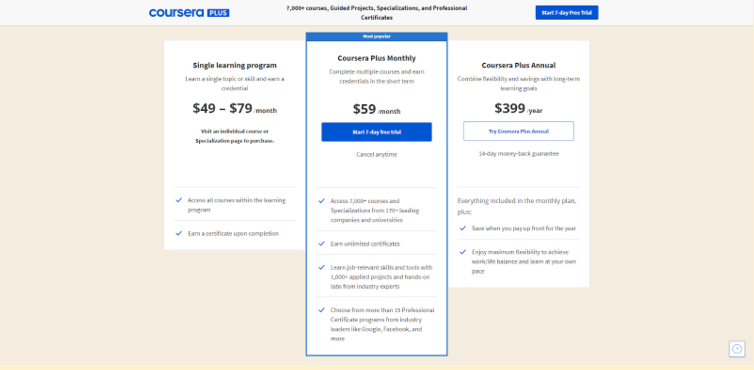
With regular offers such as Coursera Plus $1 Dollar, you can use the platform for a month for a dollar.
edX Pricing is based on a per-course pricing model with verified tracks ranging from $50 to $300. Professional certificates and MicroMasters programs cost between $150 and $1,000.
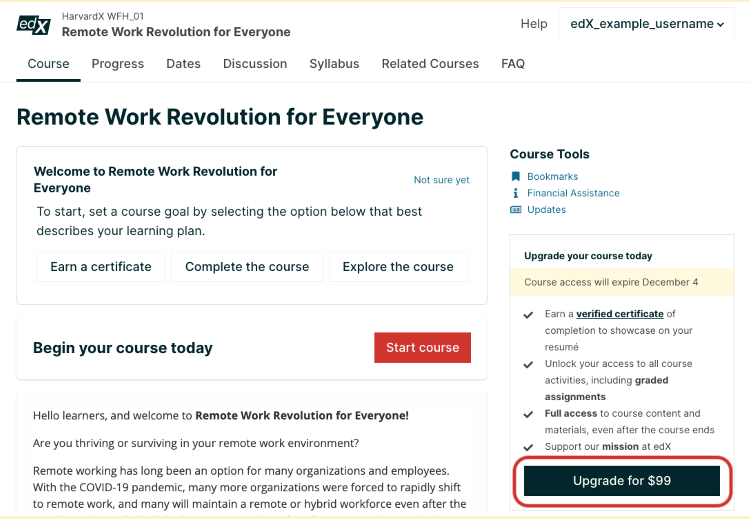
Additionally, edX charges extra fees to obtain verified certificates.
Coursera Plus vs edX
edX does not offer a subscription option, making it more expensive than Coursera for learners seeking multiple courses.

Coursera Plus, on the other hand, allows learners to earn multiple certificates and take many courses for the price of one edX course.
Coursera Vs edX Free Trials And Free Options
Coursera allows users to audit most courses for free and offers a 7-day trial for Coursera Plus. In contrast, edX also enables users to audit most courses for free but typically provides access to only the 1st chapter.
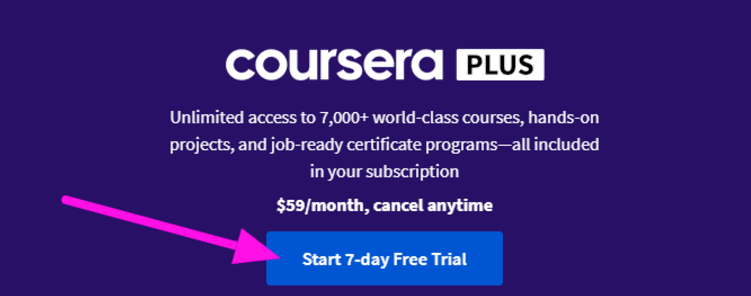
Refund Policy Coursera Vs edX
Coursera Plus offers a 14-day refund for its subscriptions if no certificate has been earned as a money-back guarantee, no questions asked.
However, the refund process may require you to state your reasons for requesting the refund for individual courses.
edX has a simple 14-day refund policy. The only rule is that the refund is void if you have already earned the certificate.
Key Differentiators Coursera vs edX
Coursera and edX have distinct key differentiators and unique features.
Coursera stands out with its Guided Projects for hands-on learning, the Coursera Plus subscription option, industry-focused certificates, and corporate partnerships.

On the other hand, edX offers unique programs such as MicroMasters, a stronger academic focus, boot camps, university credit options, and an open-source platform.

The target audience for each platform also differs. Coursera primarily attracts career-focused professionals, industry skill-seekers, corporate learners, lifelong learners, and career changers.
In contrast, edX appeals more to academic-oriented learners, university students, research enthusiasts, traditional education seekers, and subject matter experts.
Alternatives Of Coursera And edX
While Coursera and edX lead the MOOC space, several alternatives offer unique value propositions for online learning. Let’s explore how they compare:
1. Coursera Vs edX Vs Udemy
The critical difference between these platforms is that Udemy does not offer accredited certificates like the other two platforms. Read my comparison of using these platforms to learn more about such details on Coursera vs. Udemy.
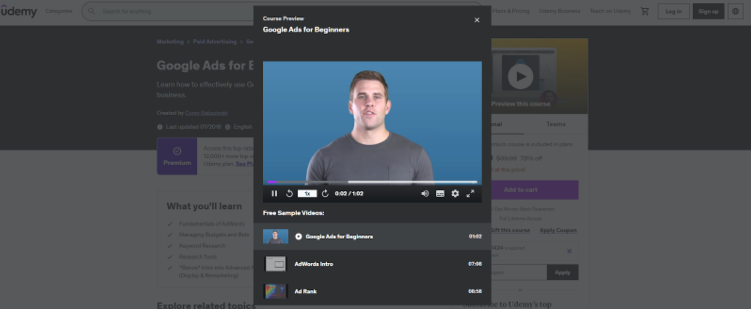
Here is a gist of the difference between Coursera Vs edX Vs Udemy
- Udemy offers more practical, skill-focused courses
- Instructor quality varies significantly.
- Lower average course prices
- More frequent sales
- Less prestigious certification
2. LinkedIn Learning vs Coursera vs edX
Here are the important differences you need to know between these three platforms:
- LinkedIn Learning focuses on professional skills.
- Direct integration with LinkedIn profiles
- Monthly subscription model
- Smaller course catalog
- Business-oriented content
To get a detailed comparison, explore Coursera vs LinkedIn Learning here.
Platform Selection Guide
Making the correct choice depends on your specific learning goals, budget, and preferred learning style. Here’s a detailed breakdown:
When To Choose Coursera?
I recommend Coursera for its industry recognition and flexible learning options. It’s powerful for:
- Career advancement in tech or business
- Professional certification needs
- Multiple course interests (subscription value)
- Industry-relevant skills
- Corporate training requirements
- Flexible learning schedules
When To Choose edX?
I recommend edX for you if you resonate with any of the following reasons:
- Academic credit requirements
- Traditional university-style learning
- Research-focused education
- Specific university course access
- Deep academic subject exploration
Conclusion: Coursera Leads With More Numbers Of Accredited Courses And Certificates
In the battle of Coursera vs edX, Coursera has the upper hand for most learners. It offers over 7,000 courses compared to edX’s 3,000+, reaches 148+ million users (vs edX’s 35+ million), and provides a more flexible learning model with subscriptions starting at $59/month.
Coursera’s collaboration with industry leaders like Google, IBM, and Meta gives its certificates higher job market value.
However, edX remains a strong choice for academically driven learners, especially in STEM fields.
Ultimately, Coursera is better for career-focused professionals seeking recognized certifications, while edX suits those preferring a traditional, university-style learning approach.
FAQs
While alternatives exist, Coursera remains the most comprehensive platform for professional development and certified learning from recognized institutions.
edX courses are recognized, especially those offering verified certificates from partner universities like Harvard, MIT, and other prestigious institutions.
Coursera leads overall, offering the best balance of course variety, recognized certification, and value through its subscription model.
Coursera is better for accredited learning and recognized certificates, while Udemy works well for specific skills at lower prices.
